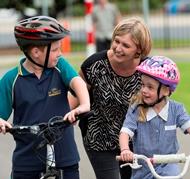11 November 2015
 Australian children have received a middle-of-the-road C grade when it comes to active transport to and from school in the 2015 Active Healthy Kids Australia (AKHA) progress report card.
Australian children have received a middle-of-the-road C grade when it comes to active transport to and from school in the 2015 Active Healthy Kids Australia (AKHA) progress report card.
The report card, titled ‘The Road Less Travelled’, focuses on active transport by school students and found only half of Australia’s children and young people walk, ride, scoot or skateboard their way to or from school at least once a week.
AHKA Research Fellow Dr Natasha Schranz says just below half of primary school students and just above half of secondary school students use active transport to or from school once a week or more.
“We set the bar quite low in this report card, but still only managed a C,” Dr Schranz says.
“Walking or cycling to school once a week is not asking a lot. Maybe as a nation we are lowering our expectations.
“We need to find the right balance between wanting our children and young people to be physically active as much as possible every day, and what is practical and achievable for Australian families.”
Parents of children aged 5-6 years and 9-10 years reported that 45 per cent and 47 per cent respectively used active travel to or from school at least once per week. The results were slightly better for high school students, but not by much: 59 per cent reported using active travel to or from school at least once per week.
“Our report card shows that travelling to school – and potentially other destinations like a friend’s house, the shops or playground – via foot or self-propelled wheel has indeed become ‘the road less travelled’,” Dr Schranz says.
“Kids today move from the capsule of their homes, into the capsule of their cars, to the capsule of their school rooms. It’s changed a lot from when their parents were kids as we have seen a 42 per cent decline in a generation. It’s certainly a very different world today compared to decades past when it was expected that children would walk one to two hours per day in their journey to school and back.”
Dr Schranz says reasons why this has happened include:
- Safety – stranger danger and road traffic safety concerns.
- The distance kids are willing or allowed to go – the distance children can or will navigate on their own has dramatically declined compared to that of past generations.
- Family and home life – families are smaller, meaning there are fewer siblings to ride or walk to school with; more families now have two working parents; and more families own at least two cars, with time being a large factor in the school drop off before work for working families.
- Location – schools are further away from homes these days, as more children go to private schools and small schools have been amalgamated into super schools.
“While there are many external factors that play a role in how active children are when getting to and from different places, we need to remember that we are also living in a society where many of our daily tasks have become sedentary and it is likely that the world will continue to adopt more labour-saving and sedentary practices,” Dr Schranz says.
“Children who use active transport to get to or from school are not only more physically active than those who do not, but also accumulate more daily minutes of health enhancing activity, take more steps, expend more energy over the day and generally have better physical fitness.
“The time to act is now. We need to be looking for every opportunity to help kids be more active, and given active transport is inclusive for all, we need to encourage the children of today for whom active transport is the ‘road less travelled’ to engage in more than what is currently being done.”
Dr Schranz says in order to improve the C grade and increase the number of Australian children and young people using active transport to and from school, a combined effort is needed from parents, the education sector, community groups, urban planning and transport sectors and government at all levels.
She suggests things that can be done now, in order to make a meaningful difference in the future, include:
- Encouraging schools to have active transport policies.
- Parents implementing ‘park and ride’ strategies where older children are dropped off and picked up at a distance away from the school grounds, or use public transport for part of their journey.
- Ensuring that surrounding school neighbourhoods have high street connectivity and optimal density levels to support and encourage active commuting to and from school and reduce the distance needed to travel by students.
- Communities advocating to councils for changes being made to the physical environment that make it easier for children to negotiate traffic, such as adequate crossing infrastructure and measures to slow traffic, so children can travel on safe walking and riding paths.
AHKA is a collaboration among Australian physical activity and health researchers. The report cards aim to encourage all Australians to make changes in their lives to promote positive lifestyle behaviours of increased physical activity participation and reduced sedentary behaviours among the children and young people of today and tomorrow.
Contact for interview: Natasha Schranz mobile 0403 658 592 email Natasha.schranz@unisa.edu.au
Media contact: Will Venn office 8302 0963 email Will.venn@unisa.edu.au or Michele Nardelli office 8302 0966 mobile 0418 823 673 email michele.nardelli@unisa.edu.au
Media note: We may be able to put media in contact with families whose children ride their bikes to school. Please contact Will Venn or Michele Nardelli to arrange.




